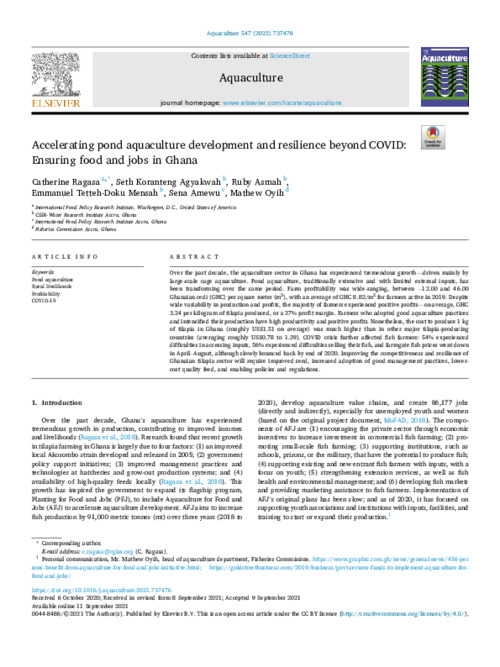Please use this identifier to cite or link to this item:
https://hdl.handle.net/20.500.12348/5441
Accelerating pond aquaculture development and resilience beyond COVID: Ensuring food and jobs in Ghana
| dc.creator | Ragasa, C. | en_US |
| dc.creator | Agyakwah, S.K. | en_US |
| dc.creator | Asmah, R. | en_US |
| dc.creator | Mensah, E.T. | en_US |
| dc.creator | Amewu, S. | en_US |
| dc.creator | Oyih, M. | en_US |
| dc.date.accessioned | 2023-01-25T13:43:49Z | |
| dc.date.available | 2023-01-25T13:43:49Z | |
| dc.date.issued | 2022 | en_US |
| dc.identifier.citation | Catherine Ragasa, Seth Agyakwah, Ruby Asmah, Emmanuel Mensah, Sena Amewu, Matthew Oyih. (30/1/2022). Accelerating pond aquaculture development and resilience beyond COVID: Ensuring food and jobs in Ghana. Aquaculture, 547. | en_US |
| dc.identifier.issn | 0044-8486 | en_US |
| dc.identifier.uri | https://hdl.handle.net/20.500.12348/5441 | |
| dc.description.abstract | Over the past decade, the aquaculture sector in Ghana has experienced tremendous growth—driven mainly by large-scale cage aquaculture. Pond aquaculture, traditionally extensive and with limited external inputs, has been transforming over the same period. Farm profitability was wide-ranging, between −12.00 and 46.00 Ghanaian cedi (GHC) per square meter (m2), with an average of GHC 8.82/m2 for farmers active in 2019. Despite wide variability in production and profits, the majority of farmers experienced positive profits—on average, GHC 3.24 per kilogram of tilapia produced, or a 27% profit margin. Farmers who adopted good aquaculture practices and intensified their production have high productivity and positive profits. Nonetheless, the cost to produce 1 kg of tilapia in Ghana (roughly US$1.51 on average) was much higher than in other major tilapia-producing countries (averaging roughly US$0.78 to 1.29). COVID crisis further affected fish farmers: 54% experienced difficulties in accessing inputs, 56% experienced difficulties selling their fish, and farmgate fish prices went down in April–August, although slowly bounced back by end of 2020. Improving the competitiveness and resilience of Ghanaian tilapia sector will require improved seed, increased adoption of good management practices, lower-cost quality feed, and enabling policies and regulations. | en_US |
| dc.format | en_US | |
| dc.language | en | en_US |
| dc.publisher | Elsevier Ltd. | en_US |
| dc.rights | CC-BY-4.0 | en_US |
| dc.source | Aquaculture;547, | en_US |
| dc.subject | rural livelihoods | en_US |
| dc.subject | pond aquaculture | en_US |
| dc.title | Accelerating pond aquaculture development and resilience beyond COVID: Ensuring food and jobs in Ghana | en_US |
| dc.type | Journal Article | en_US |
| cg.contributor.funder | CGIAR Research Program on Policies, Institutions, and Markets | en_US |
| cg.contributor.funder | CGIAR Research Program on Fish Agri-Food Systems | en_US |
| cg.coverage.country | Ghana | en_US |
| cg.coverage.region | Western Africa | en_US |
| cg.subject.agrovoc | profitability | en_US |
| cg.subject.agrovoc | covid-19 | en_US |
| cg.subject.agrovoc | Fish | en_US |
| cg.contributor.affiliation | International Food Policy Research Institute | en_US |
| cg.contributor.affiliation | Royal Tropical Institute | en_US |
| cg.contributor.affiliation | WorldFish | en_US |
| cg.contributor.affiliation | CSIR Water Research Institute | en_US |
| cg.contributor.affiliation | Ministry of Fisheries and Aquaculture Development | en_US |
| cg.identifier.status | Open access | en_US |
| cg.identifier.ISIindexed | ISI indexed | en_US |
| cg.description.theme | Sustainable aquaculture | en_US |
| cg.description.theme | Value chains and nutrition | en_US |
| dc.identifier.doi | https://dx.doi.org/10.1016/j.aquaculture.2021.737476 | en_US |
Files in this item
This item appears in the following Collection(s)
-
Sustainable aquaculture [2735]
-
Value chains and nutrition [419]
